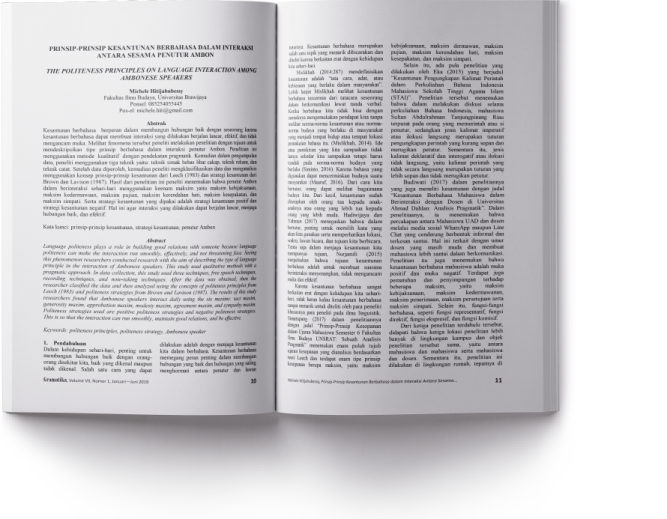THE POLITENESS PRINCIPLES ON LANGUAGE INTERACTION AMONG AMBONESE SPEAKERS
Abstract
Language politeness plays a role in building good relations with someone because language politeness can make the interaction run smoothly, effectively, and not threatening face. Seeing this phenomenon researchers conducted research with the aim of describing the type of language principle in the interaction of Ambonese speakers. This study used qualitative methods with a pragmatic approach. In data collection, this study used three techniques, free speech techniques, recording techniques, and note-taking techniques. After the data was obtained, then the researcher clasified the data and then analyzed using the concepts of politeness principles from Leech (1983) and politeness strategies from Brown and Lavison (1987). The results of this study researchers found that Ambonese speakers interact daily using the six maxims: tact maxim, generosity maxim, approbation maxim, modesty maxim, agreement maxim, and sympathy maxim. Politeness strategies used are positive politeness strategies and negative politeness strategies. This is so that the interaction can run smoothly, maintain good relations, and be effective.
References
Brown, P., & Levison, S. C. (1987). Politeness: Some Universals in Language Usage. 2nd ed. Cambridge: Cambridge University Press.
Budiwati, T. R. (2017). Kesantunan Berbahasa Mahasiwa dalam Berinteraksi dengan Dosen di Universitas Ahmad Dahlan: Analisis Pragmatil. The 5th URECOL Proceeding.
Eka, R. K. (2015). Kesantunan Pengungkapan Bahasa Indonesia Mahasiswa Sekolah Tinggi Agama Islam (STAI). Dialetika: Jurnal bahasa, satra, dan pendidikan bahasa dan satra Indonesia, 2 (1), hal. 34—49.
Hadiwijaya, M & Yahmun. (2017). Kesantunan Berbahasa dalam Interaksi antara Dosen dan Mahasiswa Multikultural. Didaktika, Vol. 23, No. 2.
Leech, G. (1983). “The Principle of Pragmatics”. London: Cambridge.
Maufur, S. (2016). Penerapan Prinsip Kerja Sama dan Prinsip Sopan Santun Berbahasa di Kalangan Masyarakat Kampung Pesisir Kota Cirebon. Al Ibtida. Vol. 3. No. 1.
Mislikhah, S. (2014). Kesantunan Berbahasa. Ar-Raniry: International Journal of Islamic studies. Vol.1. No.2.
Nurjamily, Wa Ode. (2015). Kesantunan Berbahasa Indonesia dalam Lingkungan Keluarga (kajian Sosiopragmatik). Journal Humanika. No. 15. Vol. 3.
Simatupang, M. (2017). Prinsip-Prinsip Kesopanan dalam Ujaran Mahasiswa Semester 6 Fakultas Ilmu Budaya UNSRAT: Sebuah Analisis Pragmatik.
Sisminto, S. (2016). Pelaksanaan Prinsip kesantunan Melalui Short Message Service. Seminar Nasional PRASASTI (Prakmatik: Sastra dan Linguistik).

Copyright (c) 2019 Michele Hitijahubessy

This work is licensed under a Creative Commons Attribution-NonCommercial-ShareAlike 4.0 International License.


